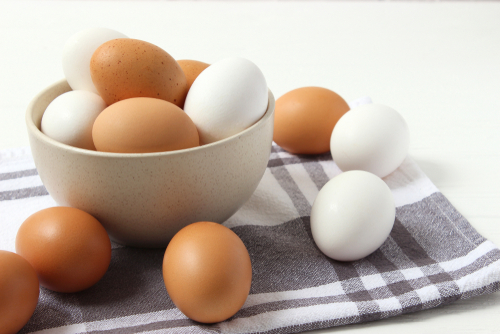
Do you know your eggs?

Image credit: Lenasirena/Shutterstock.com
Most of us are familiar with the phrase ” They know their onions”, meaning someone who knows a lot about a particular subject. Thus, while you might know your onions on some topics, what do you know about eggs?
Common Myths
Colour of the Shell
One of the biggest myths surrounding the humble hen’s egg is that brown eggs are nutritionally superior to white ones. Brown eggs come from brown feathered hens and white eggs come from white-feathered hens. Yes, it’s really that simple, and the nutritional value of eggs from both birds is exactly the same
Nutrition
The other big misconception surrounding eggs is that the cage-free or free-range variety are nutritionally superior to those of the battery hen. In reality, the only thing that determines the nutritional value of an egg is the diet of the hen that laid it. Thus, labelling such as ‘Cage-Free,’ ‘Pasture-Raised,’ ‘Free-Range,’ and even ‘Organic’ simply refers to the method the egg-laying hens have been farmed.
Price
Furthermore, neither does it mean that there would be any significant nutritional difference in any of those eggs when compared to caged hens’ eggs. Any additional cost you might find in the price of eggs over the norm, is going to be a reflection of the farming method of the hen, rather than any enhanced nutritional value of the egg. For instance, brown hens are in general, a little larger than white hens, so require a little more food, so brown eggs are usually a little more expensive than white ones.
Enhancement
The only way that a hen can produce eggs of a higher nutritional value than standard is when it’s fed a diet of nutritionally enriched feed. Eggs produced from these hens are marketed as ‘nutrient enhanced’, and are usually enriched with the likes of omega-3 fatty acids or vitamin D.
Colour of the Yolk
We also tend to assume that the yellower the yolk, the healthier the egg. Well, that’s one preconception that’s generally true! The colour of the egg yolk is solely dependent on the hen’s diet, and more specifically it’s carotenoid intake. Carotenoids are colour pigments that give egg yolks and other foods, their orangey-yellow hue, but more importantly, they also provide high levels of anti-oxidants. Hens would usually get a carotenoid enhanced diet by adding carotenoid-rich extracts to their feed, leading to the production of eggs with those bright yellow yolks that most of us like to see.
In Summary
There’s never been a greater choice available when it comes to purchasing eggs on the basis of the way they have been farmed. However, whether its price or the promotion of ethical farming that’s your motivation, all eggs have around the same level of essential nutrients. Well, that’s not unless they’ve been laid by hens on an enriched diet as mentioned. In essence, all eggs are a great source of protein, important minerals, vitamins, and good cholesterol.
With eggs in your diet, you’re definitely on to a winner!
Header image credit: White bear studio/Shutterstock.com
Have you enjoyed reading this article? If so, why not look up some of our other food features and menus in our Food & Drink section, by clicking on the provided link.





